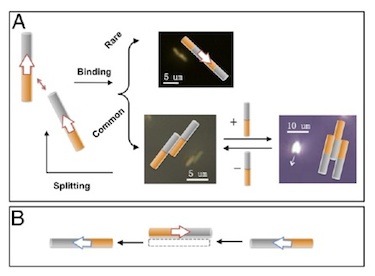Researchers at Penn State University in the US have succeeded in quantifying the forces between catalytically driven nanosized motors in fluids. The work will be crucial for making better nanomotors in the future for applications in areas such as particle sorting, chemical sensing and nanorobotics.

Nanomotor interactions
“Our research is important in the context of understanding and controlling active matter,” explains senior team member Thomas Mallouk. “Living organisms form dynamic structures that exist in non-equilibrium states by dissipating free energy. While this sounds wasteful in terms of energy loss, it enables behaviour that we associative almost exclusively with life: geese flying in formation, schools of fish, swarms of bacteria and treadmilling actin filaments are all examples of active matter at different length scales.”
Outside of living systems, however, there are few examples of active matter, especially below millimetre to centimetre length scales. Catalytic motors (devices containing catalyst particles suspended in fluids that convert the energy of chemical reactions on their surfaces into motion) are an exception, and nano- and micron-sized catalytic motors appear to behave rather like bacteria. Researchers would like to better understand and exploit this behaviour but to do so they need to find out how pairs of catalytic motors actually interact.
Positive and negative
Mallouk and colleagues have observed that pairs and triplets of rod-shaped nanomotors form in a staggered arrangement. The team already knew from prior work that there was a catalytically generated electric field around each individual powered nanorod and supposed that the staggered arrangement came from the positive end of one rod matching up with the negative end of the other.
The researchers ran numerical simulations of the ion clouds that form around pairs of powered rods to test this hypothesis. They then looked carefully at the interactions between powered rods with their positive and negative ends, and with passive tracer particles that had either a positive or negative overall charge.
“We found that the tracer particles assembled at the ends of the rods according to their charge,” Mallouk told nanotechweb.org. “By measuring the speed of the tracer particles as a function of their distance from the rods, we were also able to measure the force as a function of this distance. And we could calculate the force that held pairs of rods together from the rate at which the rods came apart.”
Understanding collective behaviour
Catalytic motors could find use in a host of applications, including chemical sensing and particle sorting, and understanding how powered motors pick up and drop off cargo particles without covalently linking the two components together could be useful in these applications, says Mallouk.
The Penn State team now hopes to better understand how collective behaviour is controlled in such devices, and in particular how nanomotors self-organise. “Having a good model for pair-wise interactions already allows us, in principle, to run simulations of much larger collections of motors, said Mallouk. “If chemical or biochemical signals can trigger collective behaviour, for example, then this might be used to amplify signals in sensors, self-healing materials and other applications.”
Indeed, team member Ayusman Sen has just published a paper in Angew. Chem. about filling cracks in bones using the chemically powered motion of specific growth factors, he added, and we are actively pursuing this, and other, related ideas.

